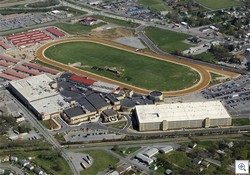 West Virginia launched a state lottery in 1986. By that date, horse-race wagering was firmly in place, having won legislative authorization in 1933. Charitable bingo games were also popular. The appearance of the lottery gave the tracks of the state a hook with which they sought to win the right to have machine gambling, and they were successful.
West Virginia launched a state lottery in 1986. By that date, horse-race wagering was firmly in place, having won legislative authorization in 1933. Charitable bingo games were also popular. The appearance of the lottery gave the tracks of the state a hook with which they sought to win the right to have machine gambling, and they were successful.
The West Virginia legislature authorized an experimental installation of video gaming machines – keno machines, poker machines and machines with symbols – at Mountaineer horse-racing track beginning on 9 June 1990. At first, only seventy machines were installed. During the experimental time the number grew to 400 in 1994, most of them being keno machines. The first machines had payouts of 88.6 percent. During a three-year experimental period the lottery agreed not to put machines in other locations. Now machines are at the three other tracks as well. The track keeps 70 percent of the revenues, and 30 percent goes to the state.
The machines were operated by the state lottery. Lottery director Butch Bryan said, “We developed VLTs [video lottery terminals] to save our horse racing industry. We think it is doing what we designed it for. It has been very beneficial to the horse track. It may not cure their problems in the long run, but it will certainly prolong their life. We believe the entertainment aspect of VLTs is good for the horse racing industry” (LaFleur 1992, 65). In 1993, Bryan was convicted of insider trading, bid rigging, and lying to a grand jury in the state’s purchase of the machines. According to a news story in International Gaming and Wagering Business November-December 1993, he owned stock in the major company that won the supply contract.
|
|